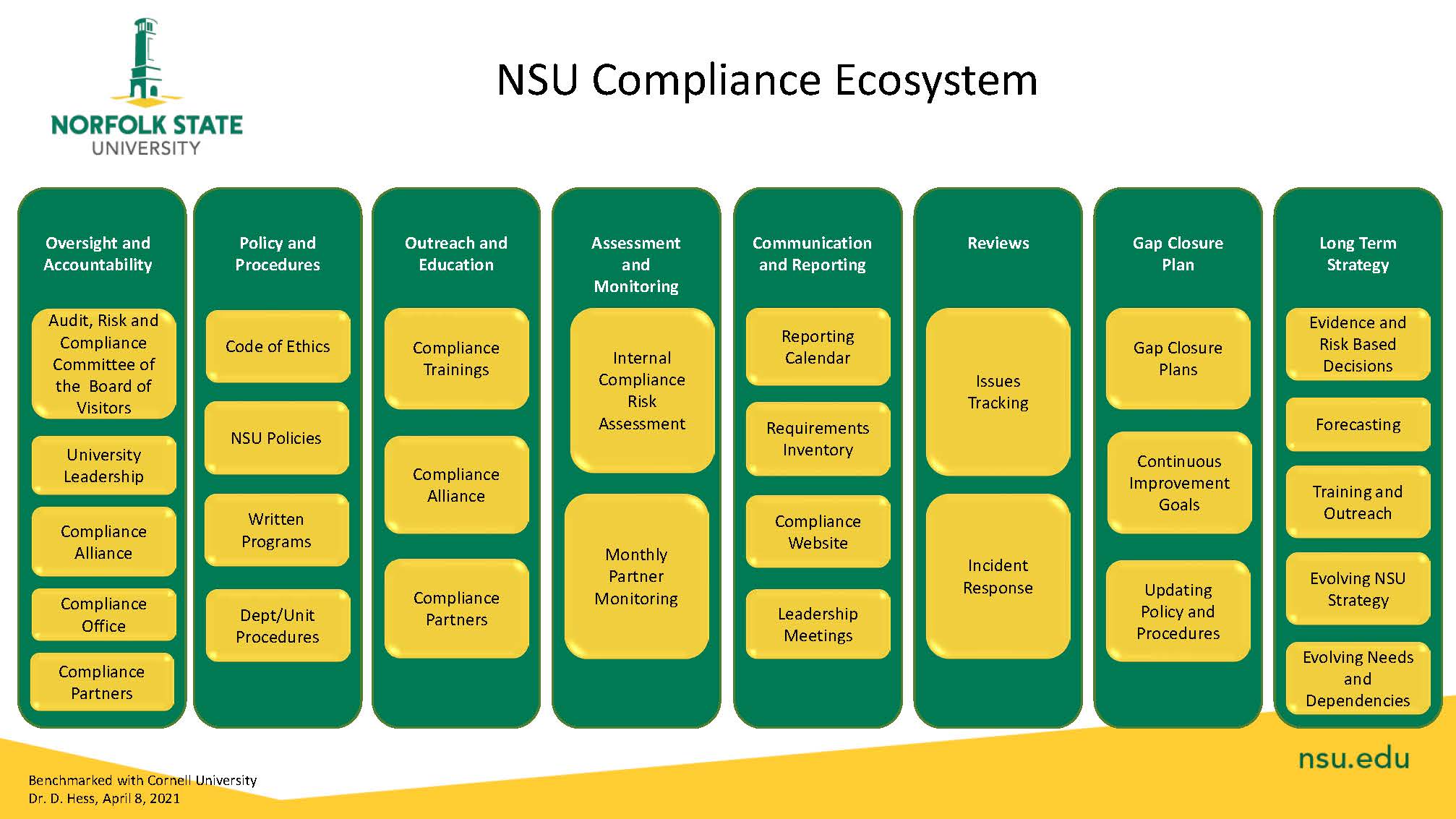Tools and Resources
Tools and guides have been developed to assist those responsible for compliance at NSU. This webpage will you help you to learn more about how to operationalize and assess compliance at NSU.
- University Compliance Ecosystem
- How to Conduct a Compliance Assessment
- Additional Compliance Resources
University Compliance Ecosystem
Norfolk State University will include the following core elements in the design of its effective and resilient compliance ecosystem:


Caption: A visual depiction of the NSU Compliance Ecosystem and its core elements. - PDF version
NSU’s Compliance Ecosystem core elements can be used as a general guide to support compliance obligations and mitigate compliance-related risks across the University.
- Oversight and Accountability
The Board of Visitors, the President, the Compliance Committee, the University Compliance Office, and Compliance Partners play critical check and balance roles in oversight and accountability for compliance obligations.
- Policy and Procedures
University-wide ethical standards, University policies, written programs, and unit procedures establish the hierarchy of written documentation that collectively guide behavioral expectations and procedural tasks associated with compliance obligations.
- Outreach and Education
Compliance-focused trainings, compliance committee and partner meetings, workshops and tabletop exercises provide awareness, convey and reinforce knowledge of compliance obligations, act as a forum for consensus building and serve as a mechanism to identify key gaps and needs.
- Assessment and Monitoring
Compliance risk assessments and reviews provide a proactive means to review and assure that compliance obligations are being managed to NSU's expectations.
- Communication and Reporting
A university-wide regulatory reporting calendar, requirements summary, website, and leadership meetings provide transparent and effective mechanisms to convey emerging regulations, regulatory reporting obligations and deadlines, compliance-related accomplishments and key compliance focus areas.
- Addressing Compliance Concerns
Issue tracking and incident response are varied mechanisms that collectively manage compliance concerns and incidents at NSU.
- Gap Closure
Progressive gap closure action plans, continuous improvement goals, and updates to policies and procedures are means to correct and prevent further compliance gaps.
Conduct a Compliance Assessment
A Compliance Assessment is used to assess and document the current state of compliance oversight, management and related risks in a given compliance area.
The assessment will help identify strengths and opportunities within a specific compliance area's ECOSYSTEM including oversight accountability, regulatory reporting requirements, compliance management, compliance risks, and key compliance gaps, along with laying the groundwork to develop a compliance gap closure plan and escalating compliance concerns as appropriate.
Consult with the University Compliance Office and the lead Compliance Partner to plan, conduct and finalize your area’s compliance assessment.
|
Overview of Compliance Assessment Process
|
|
Stage #
|
Stage Title
|
Description
|
|
1
|
Planning
|
Consult with the University Compliance Office and the lead Compliance Partner to plan a specific compliance assessment
|
|
2
|
Interviews
|
Compliance Partner and the University Compliance Office will coordinate any key interviews to understand the compliance topic
|
|
3
|
Green Sheet
|
Compliance Partner and the University Compliance Office will collaborate to complete the Green Sheet compliance assessment tool
|
|
4
|
Review
|
Compliance Partner and the University Compliance Office will review the completed Green Sheet and conduct a gap analysis
|
|
5
|
Gap closure
|
Compliance Partner will develop a gap closure plan with support of the University Compliance Office
|
|
6
|
Sign offs
|
Responsible Executive and Chief Compliance Officer receive final report and sign off on assessment findings and gap closure plan
|
Additional Compliance Resources
The following are additional compliance resources and publications:
- Higher Education Compliance Alliance (HECA) provides the higher education community with a centralized repository of information and resources for compliance with federal laws and regulations.
- Regular higher education compliance related updates and news is also provided by HECA News and Updates.
- Committee of Sponsoring Organizations of the Treadway Commission (COSO) is a joint initiative of five private sector organizations dedicated to providing thought leadership through the development of frameworks and guidance on enterprise risk management, internal control and fraud deterrence.
- Society for Corporate Compliance and Ethics (SCCE) is a member-based organization that supports compliance and ethics across different industries, including higher education. SCCE offers many compliance-focused trainings, conferences, and publications.
- US Department of Justice (DOJ) Fraud Section has published their federal framework for how to evaluate the adequacy and effectiveness of compliance programs, Evaluation of Effective Compliance Programs (June 2020).